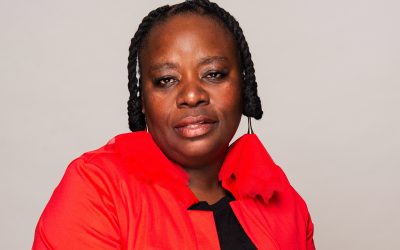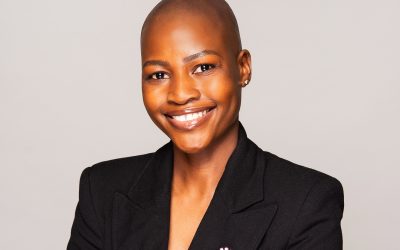Sefako Makgatho Health Sciences University (SMU) has long been recognised as a hub for academic excellence and innovation. However, beyond its reputation for rigorous academic programmes and cutting-edge research, SMU plays a vital role in shaping the leaders of tomorrow. Through its commitment to leadership development, SMU equips students with the skills, knowledge, and experiences necessary to drive positive change in society. One notable example of SMU’s success in cultivating leaders is Jerry Thoka, whose remarkable journey is a testament to the university’s transformative power.
 From the rural village of Zebediela in Limpopo to the corridors of corporate governance and actuarial science, 28-year-old Thoka’s journey is one of resilience, faith, and a steadfast commitment to creating societal impact. Raised in a modest household by a truck driver father and a mother working on a poultry farm, he was no stranger to financial hardship. However, instead of being weighed down by his circumstances, he was driven by an unwavering desire to rise above them.
From the rural village of Zebediela in Limpopo to the corridors of corporate governance and actuarial science, 28-year-old Thoka’s journey is one of resilience, faith, and a steadfast commitment to creating societal impact. Raised in a modest household by a truck driver father and a mother working on a poultry farm, he was no stranger to financial hardship. However, instead of being weighed down by his circumstances, he was driven by an unwavering desire to rise above them.
“Growing up in a financially constrained household was never easy, but it gave me the motivation to work harder,” he reflects. “I knew that education was my gateway to changing my circumstances.”
His exceptional aptitude for mathematics and science earned him top student honours at Makhutjisha Senior Secondary School, setting the foundation for his academic pursuits. Thoka began his higher education at Sefako Makgatho Health Sciences University (SMU), where he pursued a Bachelor of Science in Mathematical Sciences, specialising in Applied Mathematics and Computer Science. Recognising his passion for actuarial science, he later enrolled at the University of the Free State (UFS) to further his studies in the field. His time at UFS was marked by rigorous academic challenges, earning multiple actuarial exemptions and establishing his credibility within the Actuarial Society of South Africa (ASSA).
“Actuarial science is more than just numbers; it’s about using data to solve real-world problems and manage risks,” he explains. “This field has the power to influence financial security, social policies, and economic structures.”
Thoka’s expertise led him to Munich Reinsurance of Africa, where he currently works as an Actuarial Analyst. In his role, he engages in financial modelling and risk reserving, helping companies maintain stability in the face of uncertainty. His work underscores the critical role actuarial science plays in safeguarding financial security and mitigating economic risks.
Beyond his technical expertise, he has distinguished himself as a formidable leader in governance and policy advocacy. His leadership journey began at SMU, where he served as a mentor and later as Chairperson of the Residence Committee. His passion for student advocacy propelled him into the Student Representative Council (SRC), where he championed postgraduate funding and research opportunities.
In 2021, Thoka took on a more prominent leadership role as President General of the Institutional SRC at UFS, making history as an influential voice in university governance. As a member of the Senate and Institutional Forum, he actively contributed to shaping institutional policies, advocating for student welfare, and addressing systemic challenges in higher education.
“Leadership, to me, is about service and impact,” he asserts. “It’s about using one’s knowledge and position to create opportunities for others and drive meaningful change.” His governance work extended beyond university borders when he engaged with the South African Union of Students (SAUS) on policy development. In November 2024, he was elected as a Member of the UFS Council, where he continues to influence strategic decision-making.
“My election into the UFS Council disrupts the norm and introduces critical technical skills into governance. Having led two competitive institutions, I bring a unique student-centred perspective to the Council.” Thoka’s leadership was put to the test during the COVID-19 pandemic, where he played a pivotal role in reintegration policies, ensuring academic continuity while prioritising safety. He was also instrumental in the university’s adoption of a workers’ insourcing policy, benefiting both students and staff.
A devout Christian, he attributes much of his leadership philosophy to his faith. He believes in the principles of servant leadership, as exemplified in Matthew 23:11 (KJV): “But he that is greatest among you shall be your servant.” “Faith has kept me committed to genuine societal development, ensuring that my leadership remains rooted in integrity,” he states. “Greatness is attainable by anyone willing to serve.”
Thoka’s dedication to community upliftment extends beyond his personal achievements. He envisions a future where young professionals merge technical expertise with social responsibility. To this end, he co-founded the Chamber of Executive Youth (COEY), an initiative aimed at mentoring and equipping young professionals with critical skills while fostering leadership capabilities.
“Many skilled professionals limit their contributions to their fields, depriving society of their impact. COEY will recruit and persuade masters of scarce industries to engage in societal development and governance,” he explains. “We need to build a generation of young executives who are not only technically skilled but also socially conscious.”
His advocacy in higher education governance also centres on inclusivity and equity. As a member of the UFS Council, Jerry supports policies that ensure diverse student populations have access to quality education and resources. He emphasises the importance of scholarships, community partnerships, and outreach efforts to uplift underrepresented groups.
Thoka’s story is one of relentless ambition and purpose-driven leadership. “My aspiration is to leave behind a legacy of inspiration—a testament to the endless possibilities available to those who dare to dream. I want individuals to see, through my journey, that one’s background does not determine their ultimate success,” he concludes.
By Tumelo Moila



